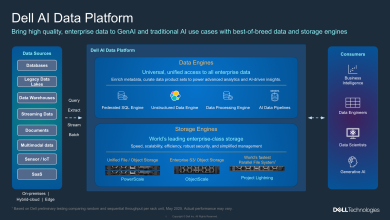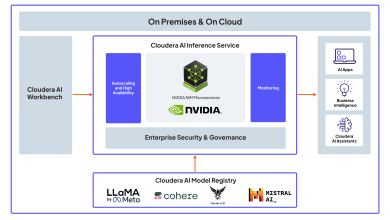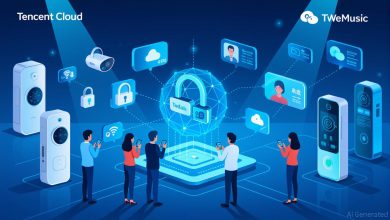Hyperscience Unveils Latest Version of the Hyperscience Hypercell Turnkey: Turnkey AI Infrastructure Software Designed for the Enterprise

Hyperscience, a market leader in hyperautomation, today announced the Hyperscience Hypercell, an all-in-one enterprise AI infrastructure software platform designed to accelerate transformational AI initiatives at scale in a variety of enterprise settings where security, compliance, and infrastructure requirements are top priorities. Hyperscience also announced improvements to Hyperscience R39, including updated proprietary ML models, applications, and automation workflows. The combination of Hyperscience Hypercell with R39 delivers unmatched accuracy and automation across the entire spectrum of documents and information assets that organizations rely on to run their business, in the most difficult and challenging enterprise environments.
“All transformational technologies, including AI, struggle in their adoption into the enterprise, because of unique legal, security, compliance, and data handling requirements,” said Andrew Joiner, CEO of Hyperscience. “The latest release of the Hyperscience Hypercell meets those standards, and removes barriers to bring the benefits of AI into the core of the enterprise. Combined with the latest release of Hyperscience R39, customers can now choose one platform for AI to meet their most complex document automation needs, and achieve tangible ROI compared to existing legacy approaches.”
Organizations across the globe recognize the potential for transforming their business with AI. However, these organizations are experiencing significant challenges, since enormous general purpose LLMs haven’t delivered the requirements unique to enterprises such as security, data trustworthiness, compliance, and transparency, and running AI at scale can be a complex, high-risk undertaking.
Businesses and governments are reluctant to serve up their unique proprietary data and assets to train LLMs, since doing so can generate huge costs and incur competitive, privacy, security, and compliance risk. Organizations cannot afford the reputational and business risk associated with hallucinations and inaccuracies – for instance filling a patient’s prescription incorrectly, or misinterpreting language and meaning in the insurance claim of a VIP customer. Also, given the velocity of innovation in AI, model lifecycle management and training data management systems struggle to keep pace, and maintain auditability, traceability, and governance of their models.
Hyperscience Hypercell – Turnkey AI Infrastructure Software Designed for the Enterprise
Hyperscience meets the highest enterprise standards with the Hyperscience Hypercell, delivered through a turnkey AI infrastructure software approach. The Hyperscience Hypercell was purpose-built to address the stringent accountability, data security, compliance, legal, regulatory, and privacy concerns that are top of mind when applying AI for business use cases.
Designed to run in all environments – on-premises, hybrid cloud, SaaS, and air-gapped environments – the Hypercell provides customers with flexibility to run their AI initiatives in the manner that best fits their needs. Also, the Hypercell infrastructure provides the governance and security required for customers to run proprietary models, as well as open source and Frontier models, all from one turnkey platform. The platform allows customers to privately train models with their own enterprise ground truth data and includes an easy-to-use interface that enables business users to supervise results based on their own domain expertise.
Hyperscience R39 – Driving a Fundamental Shift in Document-Centric Automation
Hyperscience R39 is the latest version of the Hyperscience software offering, and provides a comprehensive collection of proprietary models, applications, and automation flows. Built on proven AI, the software uniquely understands content in a wide spectrum of documents. This allows organizations to process and act on the data assets spread across their organization, with human-level accuracy rates of 99.5%.
- Models – deliver intelligent extraction, classification, understanding, comparison, and summarization of all variations of data, from highly structured to unstructured, human-friendly content.
- Applications – provide a low-code / no-code approach to operating the system, with no data scientist or developers needed, so business users can train, QA and supervise the process with intuition and ease. The Hypercell also includes co-pilot capabilities that provide users with an easy experience for building applications on the platform.
- Automation Flows – allow customers to define their end-to-end automation approach, with out-of-the-box (OOTB) blocks and configurable code blocks with LLM innovations that stitch together model capabilities.
Model Lifecycle Management at Scale
Hyperscience has deepened its model lifecycle capabilities in R39, enabling organizations to orchestrate, upgrade, and manage models more efficiently and with stronger governance, resulting in faster time to value and lower total cost of ownership. Updates include:
- Incremental training – allows customers to leverage existing investments in models when updating and fine-tuning ML models. Customers can simply re-train existing models with new data only, allowing them to decrease model training time by up to 50 percent.
- Training Data Management for Classification models – enables customers to preview, list, edit, and manage training documents used to train their models for both classification and identification all in one easy-to-use interface, saving customers time in putting models into production.
- Automated upgrade management – provides automated checks and notifications for prerequisites to address before upgrading Hyperscience software. These capabilities are especially important in AI, given that upgrading AI models can be complex and producing an incorrect model can have costly downstream impact.
- Trainer resiliency – ensures that in the event of a model training interruption, the training does not have to revert back to the very start of the process, but can resume from the point just before the interruption.
- Audit log enrichment – R39 also provides audit log enrichment, which traces user events and processes metadata from across the platform.
Enterprise-Class Hyperautomation
Hyperscience also continues to extend its enterprise class hyperautomation capabilities in the R39 release, with more tools for developers, storage APIs, and expanded Chinese language support.
- Free form text fields in custom supervision – flow developers can now add freeform data through the Custom Supervision interface, resulting in richer contextual understanding throughout end-to-end automation processes.
- Multiple tables automation – customers can easily identify and extract data from multiple, independent tables within a single document, such as invoices, billing statements, specification sheets, and contracts. These improvements build on best-in-class capabilities from Hyperscience for processing complex data and tables, and allows business users to build workflows to automate and review extractions from multiple tables at scale.
- Language improvements – organizations can now process all types of documents, from structured to unstructured, human-friendly content, in Chinese. These capabilities are valuable for international organizations requiring understanding and processing of Chinese content.
- Amazon Simple Storage Service S3 connector – provides out-of-the-box integration with Amazon S3, so customers can integrate and configure the right storage directly from the Hyperscience platform user interface.
Hyperscience will host a webinar on April 11, 2024 at 11:00 am ET to provide an overview and demo of the Hyperscience Hypercell and the Hyperscience R39 release, and Q&A. Click here to register.
The Hyperscience Hypercell and Hyperscience R39 are available now. For more information about Hyperscience, please visit www.hyperscience.com and follow the company on LinkedIn and Twitter.




